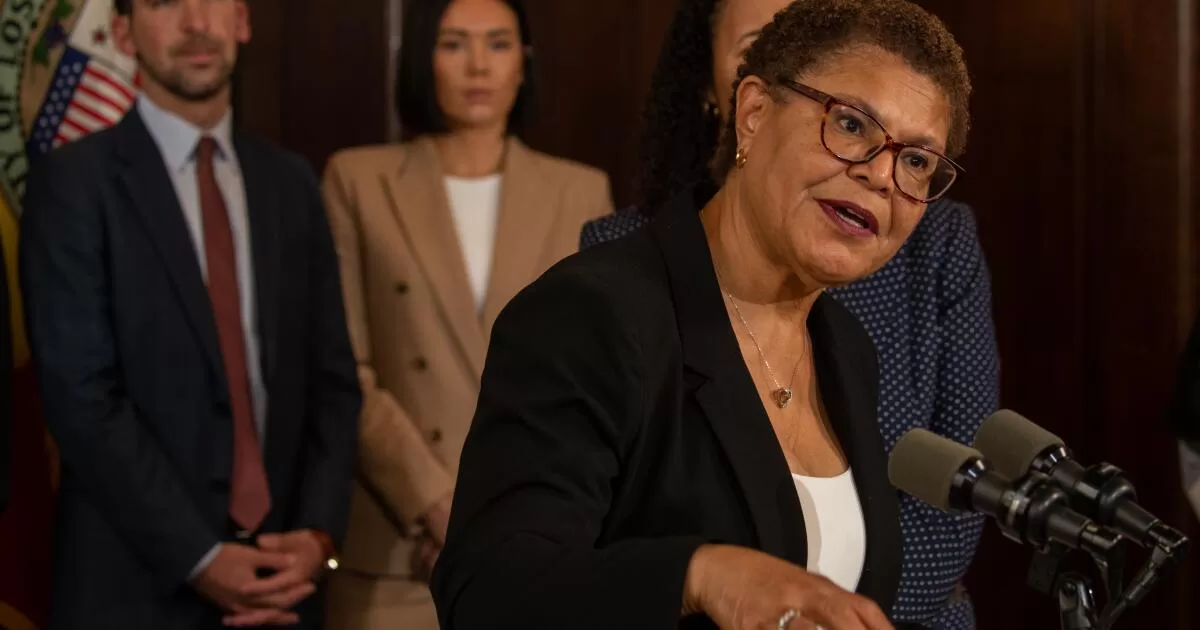Mayor Karen Bass has vetoed a proposed ballot measure to rework the disciplinary process at the Los Angeles Police Department — a step that could result in its removal from the Nov. 5 ballot.
In her veto letter to the City Council, Bass said the proposal, which would have allowed the police chief to fire officers accused of some types of serious misconduct, “risks creating bureaucratic confusion” within the LAPD.
Bass said the proposal, which also would have reworked the composition of the department’s three-member disciplinary panels, had “gaps in guidance” and and provided “ambiguous direction.”
“I look forward to working with each of you to do a thorough and comprehensive review with officers, the department, and other stakeholders to ensure fairness for all,” she wrote. “The current system remains until this collaborative review is complete and can be placed before the voters.”
Bass issued her veto during the council’s summer recess, when meetings are canceled for three weeks. The deadline for reworking the language of the ballot proposal has already passed, City Clerk Holly Wolcott said.
“If the council does not override the veto or take any action, the measure will be pulled from the ballot,” Wolcott said in an email.
The 15-member council’s next meeting is scheduled for July 30. Whether it can muster 10 votes to override the mayor’s veto is unclear.
By issuing the veto, Bass effectively sided with top LAPD brass, who warned last month that the proposal would create a two-tier disciplinary system, with some offenses resulting in termination by the chief and others heading to a disciplinary panel known as a Board of Rights.
The mayor’s appointees on the Board of Police Commissioners also criticized the ballot proposal, saying they felt excluded from the deliberations. At least one commissioner voiced concern about the proposal’s creation of a binding arbitration process to resolve cases where an officer files an appeal of his or her termination.
Councilmember Hugo Soto-Martínez expressed similar worries, arguing that binding arbitration would lead to more lenient outcomes for officers accused of serious wrongdoing. Soto-Martínez, who voted against the proposal last month, also had argued that the range of offenses that would lead to termination by the police chief was too narrow.
An aide to Soto-Martínez said Tuesday that his boss supports the veto.
Councilmember Tim McOsker, who spearheaded the ballot proposal, said he is “deeply disappointed” with the mayor’s action, arguing that it threatens the most significant reform of the LAPD’s disciplinary system in more than two decades.
If the council fails to override the veto, the next opportunity for major reform would not occur until the 2026 election, McOsker said.
“What this veto would do is put us back in the status quo for at least two years,” he said in an interview.
McOsker said he is still looking at the options for responding to the mayor’s veto.
During the council’s deliberations last month, Soto-Martínez took aim at the decision to let the chief fire officers for some offenses but not others. He and three other council members — Nithya Raman, Eunisses Hernandez and Curren Price — backed a proposal to seek additional changes to the measure, in hopes of eliminating what he called “ambiguity” in the disciplinary process.
That effort was defeated on a 9-4 vote. Had it passed, it would have likely killed the ballot measure for this year’s election, since the deadline had passed for making extensive changes.
The ballot proposal ultimately passed 11 to 2, with two members — Marqueece Harris-Dawson and Kevin de León — absent.
The proposal vetoed by Bass had been billed as a way to undo some of changes brought by Charter Amendment C, a ballot measure approved by voters in 2017, which paved the way for all-civilian disciplinary panels at the LAPD. The proposal would have reworked the system, ensuring that each panel would have have two civilian members and one commanding officer.
Representatives of the Los Angeles Police Protective League, which represents about 8,800 rank-and-file officers, did not immediately comment. Last month, the union said the ballot proposal struck “the right balance” on disciplinary issues, ensuring that officers who are terminated by a chief have access to an appeal process with binding arbitration.
Union officials have long argued that a double standard exists at the LAPD, with senior officers and those with connections often escaping serious punishment for misconduct. They have made Deputy Chief Michael Rimkunas the face of the union’s fight against what they see as an unfair disciplinary system, putting him on the cover of its monthly magazine under the heading “INTERNAL AFFAIRS … IS BROKEN.”
Rimkunas has defended the department’s discipline process, calling it “impartial, fair, and equitable.” While he has argued in favor of giving the chief of police the authority to fire problem officers, he also pushed back on the some elements of the ballot proposal, including binding arbitration.
Appearing at the council last month, Rimkunas warned that the ballot proposal would create “two different systems for similar types of misconduct, leading to confusion and inconsistent disciplinary outcomes.”
Bass, in her veto letter, said she exercised her veto authority after speaking with hundreds of LAPD officers about the future of the department. Those officers, she said, “shared their collective frustrations about the entire LAPD discipline system, arguing the need for a more fair and better-defined process.”
McOsker, an attorney who represented the LAPD union for several years, said it was “inconsistent” to listen to complaints about a broken process and then veto a major attempt at fixing it.
“The fact that LAPD command staff wants something else is not a good enough reason to take this away from the voters,” he said.
